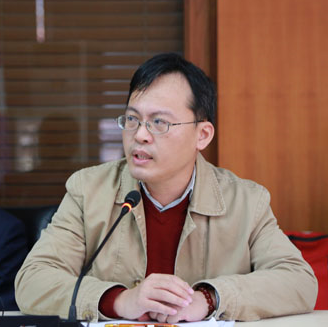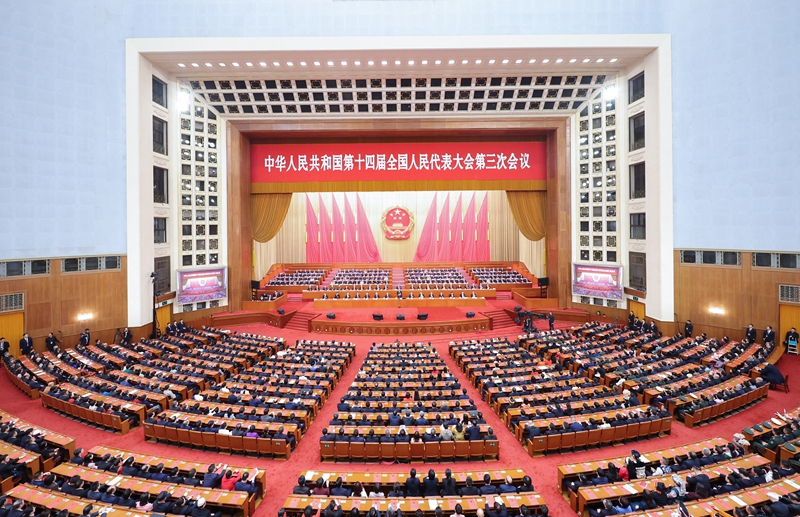The 2025 sessions of China’s National People’s Congress and the Chinese People’s Political Consultative Conference (CPPCC) were held in Beijing on March 4-5. Given the ongoing slowdown in China’s economic growth and increased uncertainty in U.S.-China relations since Donald Trump’s return to power, the State Council placed particular emphasis on economic policy adjustment in its briefing ahead of the government work report. This shows that the economy is China’s primary domestic concern. Picture source: The State Council, China, March 11, 2025, https://www.gov.cn/yaowen/tupian/202503/content_7013019.htm#1.
Prospects & Perspectives No. 19
Hot Topics at China’s 2025 ‘Two Sessions’
By Wen-Hsuan Tsai
The 2025 sessions of China’s National People’s Congress and the Chinese People’s Political Consultative Conference (CPPCC) (known as the “two sessions” 兩會) were held in Beijing on March 4-5. Given the ongoing slowdown in China’s economic growth and increased uncertainty in U.S.-China relations since Donald Trump’s return to power, the State Council placed particular emphasis on economic policy adjustment in its briefing ahead of the government work report. This shows that the economy is China’s primary domestic concern. The CPPCC meeting received less coverage than it had in previous years. However, judging from interviews with CPPCC members and reports in the official press, the CPPCC is expected to focus on scientific and technological development and the realization of Chinese-style modernization in the year ahead.
Key Points of the Two Sessions
This year’s Government Work Report, issued by the State Council, attributed last year’s economic performance to social stability and technological progress, and once again set an economic growth target of 5%. Other tasks listed for the coming year were “boosting domestic demand” (ranked third last year, but now the top priority), followed in order of importance by the development of “new productive forces,” building the country through science and education, economic system reform, and a stable opening-up to foreign investment. Issues related to the maintenance of social stability and social welfare are given relatively low priority.
Overall, this year’s work report is still focused on development, in particular boosting domestic consumer confidence to cope with the uncertainty afflicting local government finances and the U.S.-China trade war. China is still enjoying the effects of the launch of DeepSeek at the beginning of the year, so it is no wonder that some of the other reports emanating from the sessions concern artificial intelligence, technological innovation, and renewable energy. These preoccupations reflect the expectations of foreign investors and are intended to stabilize market confidence. Although social issues have also been addressed, the Chinese government seems to believe that economic development is the answer to any stability problems. The only issue that has been hotly debated among the public is the adjustment of urban and rural residents’ pensions.
The work report of the CPPCC Standing Committee focuses on setting out the results of its work over the last year, while the plans for this year lack detail. The report repeatedly emphasizes Xi Jinping’s leadership and lists data on research activities, consultation and deliberation activities, proposals from members, inspections, and publications. It covers the need to strengthen the leadership of the CCP Central Committee, develop “consultative democracy,” advance the work of the united front, and expand foreign exchanges. Specifically mentioned in the report is that in 2024, the CPPCC established a “system for members of the Chairman’s Conference to study and conduct research in units where members of the National Committee of the Chinese People’s Political Consultative Conference are located.” What CPPCC members are required to study as a form of political training are important works by Xi.
The CPPCC’s tasks for the year ahead center on four core issues, namely, upholding the overall leadership of the CCP, strengthening “ideological and political guidance in complex situations,” offering suggestions on Chinese-style modernization, and improving the mechanism of consultative democracy. All in all, this was mostly business as usual for the CPPCC.
Analysis and Discussion
This year is the last year of the 14th Five-Year Plan, and it has been announced that the main work associated with this has been completed. The high-tech sector continues to lead the Chinese economy and is one of the top concerns of middle-income citizens. However, electric vehicle (EV) production and AI may be impacted by political interference at home and U.S. tariffs, and these uncertainties may inhibit innovation. Issues such as local government debt and financial risk remain obstacles to market momentum. Another threat to social stability is whether the record 12.22 million college students due to graduate this year will be able to find jobs, and whether local governments have the policies in place to respond to this.
In the hope that economic development will help maintain social stability, the Chinese government has called for high-quality development. Large private companies seem to have become active again in the wake of a symposium held by Xi. However, ordinary people are more concerned about whether the adjustment of basic benefits such as pensions can keep up with social dynamics and price levels, while the concerns of a lot of young people center on whether they will be able to get a job after graduation. From this point of view, the government’s measures to boost consumer confidence do not seem to be sufficiently down to earth (接地氣). If the above problems cannot be effectively addressed in the short term, social conflict may ensue.
Although the CPPCC Standing Committee’s work report hardly touches on current trends, interviews given by members to the press during the session focused on the need for the CPPCC to strengthen its ties with the scientific and technological, economic, and environmental and resources communities in the coming year. For example, in their interviews with the Global Times (環球時報), four CPPCC members with expertise in science and technology touched on such topics as algorithms, nuclear energy, space technology, and AI models. China’s Science and Technology Industry, which is affiliated with the Ministry of Science and Technology, also interviewed CPPCC members, including members of a university party committee, a university professor, and the manager of a tech firm, who called for the nurturing of STEM talent and more links between industry and academia. These interviews were all aimed at increasing public awareness of and confidence in the country’s science and technology strategy. They also indicate that in future, the CPPCC, as China’s main united front body, will pay more attention to people working in these fields and even contribute resources. In addition, most of the reports in the official press concern “new productive forces” (namely, disruptive and cutting-edge technologies), technological innovation, and green energy. There is relatively little discussion of religion, ethnicity, Taiwan, or Hong Kong and Macao.
Conclusion
Overall, the content of the two sessions indicates that China will continue to focus on economic growth in the coming year, try to expand domestic demand, and promote the transformation of the economy through technological innovation. Its policy on social governance will remain the same. One notable development is that the CPPCC’s role in supporting national development and politics is becoming increasingly prominent. Unlike previous years, discussions at the CPPCC session were less concerned with religious or ethnic issues, Taiwan, or Hong Kong and Macao affairs, indicating that its focus has shifted toward science and technology and economic development. The reports of the two sessions also highlighted the importance of consultative democracy and the need for the CCP to recruit private entrepreneurs and scholars to strengthen its united front work.
(Dr. Tsai is Research Fellow, Institute of Political Science, Academia Sinica, Taiwan.)


